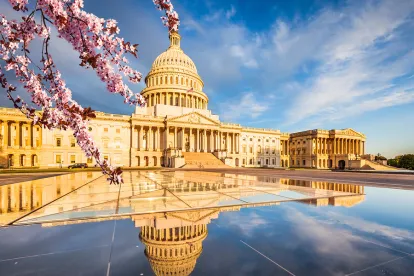With the House of Representatives and Senate deadlocked over competing versions of police reform legislation, a divided Washington has failed, at least for the moment, to heed the national call for action on racial injustices that emerged from the killing of citizen George Floyd. The division could portend failure ahead on other urgent matters of national policy, as Republicans and Democrats in Congress are similarly divided on priorities for the continued federal response to COVID-19 and the recession triggered by the pandemic. A national employment report will be issued by the Bureau of Labor Statistics one week from today that will significantly impact the trajectory of deliberations over the eventual coronavirus response legislation, and information released yesterday hints that the report may bring more bad news for an economy struggling to rebound as the US experiences what could be a second wave of the virus.
Via AP:
The number of laid-off workers seeking U.S. unemployment aid barely fell last week, and the reopening of small businesses has leveled off — evidence that the job market’s gains may have stalled just as a surge in coronavirus cases is endangering an economic recovery.
The government also reported Thursday that the economy contracted at a 5% annual rate in the first three months of the year, a further sign of the damage being inflicted by the viral pandemic. The economy is expected to shrink at a roughly 30% rate in the current quarter. That would be the worst quarterly contraction, by far, since record-keeping began in 1948. Economists do expect a snap-back in the second half of the year, though not enough to reverse all the damage.”
Topics covered today include: tax and economic development, health, government oversight and US states developments.
Conventional wisdom for some time has held that Congress will unify before August to enact another major COVID-19 response bill comparable to the March 27 CARES Act, the US$2.2 trillion package passed with bipartisan support as the nation went into lockdown last spring. The expiration at the end of July of the enhanced unemployment benefits provided by CARES has been seen as an action-forcing deadline that will bring the two parties to the negotiating table to hammer out another broad package acceptable to both the Republican-led Senate and the Democratic-controlled House. But with July around the corner and police reform having dominated leadership attention for weeks, party leaders have yet to begin even informal discussions about the next pandemic response measure, and they face internal divisions within their own caucuses about how the government should proceed.
The congressional calendar in the weeks ahead will present a challenge. The House and Senate will be adjourned for the Independence Day work period. Following the break, the House and Senate are not scheduled to return until July 20, and the House is scheduled to depart for Congress’ traditional month-long August recess on July 31. The result is that House Speaker Nancy Pelosi (D-CA), Senate Majority Leader Mitch McConnell (R-KY), Senate Minority Leader Chuck Schumer (D-NY) and House Minority Leader Kevin McCarthy (R-CA) – who will negotiate the measure with Treasury Secretary Steven Mnuchin, acting on behalf of President Donald Trump – may have a relatively narrow window for reaching agreement, selling it to their members and passing it through both chambers.
On Thursday, senior committee staff on Capitol Hill indicated they still have little insight as to how July is likely to play out. The GOP-controlled Senate has yet to produce an alternative of any kind to the US$3 trillion HEROES Act passed by the Democratic-led House in May as a proposed sequel to the CARES Act. Mixed signals have emanated from the White House and congressional Republican leadership offices for weeks about what the GOP will seek in the next measure. Next week’s national jobs report will have major political ramifications that will surely impact Republican leaders’ strategy for the anticipated negotiations.
“If there’s a bad jobs report — and when you see more people out of work than last month — then there may be an impetus by more Republicans in the conference to provide broader support and more stimulus spending than they’re talking about right now,” Ben Koltun, senior policy analyst at Beacon Policy Advisors, tells The Hill.
Tax and Economic Development Updates
Yesterday, the Federal Reserve announced the results of its stress tests for 2020, along with additional sensitivity analyses conducted in light of COVID-19. In releasing the results, Vice Chairman for Supervision Randall Quarles noted: “The banking system has been a source of strength during this crisis, and the results of our sensitivity analyses show that our banks can remain strong in the face of even the harshest shocks.” According to the central bank, aggregate loan losses for the 34 banks ranged from US$560 billion to US$700 billion in the sensitivity analysis and aggregate capital ratios declined from 12.0% in the fourth quarter of 2019 to between 9.5% and 7.7% under the hypothetical downside scenarios. As a result, the Federal Reserve is taking several actions to ensure large banks remain resilient despite ongoing economic uncertainty. Specifically, in the third quarter, the Federal Reserve will require large banks to preserve capital by “suspending share repurchases, capping dividend payments, and allowing dividends according to a formula based on recent income.” Notably, the stress tests designed before COVID-19 show that, in the aggregate, all large banks remain strongly capitalized. The central bank will use the results of its test to set the new stress capital buffer requirement, which will take effect in the fourth quarter.
Additionally, the Federal Reserve – along with the Commodity Futures Trading Commission, Federal Deposit Insurance Corporation, Office of the Comptroller of the Currency and Securities and Exchange Commission – yesterday issued a final rule modifying the Volcker Rule’s prohibition on banking entities investing in or sponsoring hedge funds or private equity funds (i.e., covered funds). By way of reminder, the Volcker Rule generally prohibits banking entities from engaging in proprietary trading and from acquiring or retaining ownership interests in, sponsoring or having certain relationships with a hedge fund or private equity fund. The final rule modifies three areas of the Volcker Rule by: (1) streamlining the covered funds portion of the rule; (2) addressing the extraterritorial treatment of certain foreign funds; and (3) permitting banking entities to offer financial services and engage in other activities that do not raise concerns that the Volcker Rule was intended to address.
Separately, while it remains unclear whether Congress will be able to reach agreement on an approach to investing in America’s infrastructure this year, yesterday, Senate Finance Committee Ranking Member Ron Wyden (D-OR) and Senator Maria Cantwell (D-WA) introduced legislation – the Emergency Affordable Housing Act of 2020 – that would implement the housing credit provisions included in House Democrats’ infrastructure proposal. In addition to the legislative text, Senators Wyden and Cantwell have also released a one-page summary, along with a more detailed summary, highlighting some of the bill’s key features, including: (1) expanding low-income housing tax credit (LIHTC) production; (2) increasing LIHTC credits for projects that target “deeper affordability”; (3) providing support for LIHTC developers and operators; and (4) “closing loopholes to preserve and promote affordable housing.”
Health Updates
After two days in a row of record-high number of cases, the top official at the Centers for Disease Control and Prevention (CDC) projected that the actual number of those with COVID-19 could be much higher. On a call with reporters, CDC Director Robert Redfield said, “our best estimate right now is that for every case that’s reported, there actually are 10 other infections.” That conclusion was based on data from national serological testing, also known as antibody tests, which indicate whether an individual’s immune system has previously fought off the coronavirus. The samples were derived not only from those who voluntarily took the specific analysis, but also from blood donated or other lab tests. Currently, there are 2.3 million COVID-19 cases reported in the US; this new estimate pushes the actual number of coronavirus cases up to at least 23 million.
The CDC also updated and expanded the list of those who are at an increased risk of getting severely ill from the disease. As reports of more young people contracting the disease continue, the CDC warned that, “among adults, risk increases steadily as you age, and it’s not just those over the age of 65 who are at increased risk for severe illness.” The list of underlying conditions that make an individual more susceptible was also updated, based on reports, studies and other data. These include: chronic kidney disease; chronic obstructive pulmonary disease; serious heart conditions; sickle cell disease; type two diabetes; and a weakened immune system.
On Thursday, the House Ways and Means Committee held a hearing examining the COVID-19 impact on nursing homes. The facilities were major hotspots in the initial phases of the pandemic, and the Centers for Medicare and Medicaid Services recently reported that close to 31,000 nursing home residents have died of the disease. Nearly all of the witness panel, which was made up of a family member, an academic, healthcare providers and an advocacy organization, agreed that addressing workforce issues was key to making improvements. They also concurred that regular testing of both employees and residents, and the reporting of those results, was critical to the efforts. Some Democrats on the committee slammed the administration’s response. In his opening statement, Full Committee Chairman Richard Neal (D-MA) stated, “the Trump Administration has repeatedly weakened safety standards that have degraded care overall and made residents more at-risk to infectious disease outbreaks.” In his opening statement, Health Subcommittee Chairman Lloyd Doggett (D-TX) declared, “the Trump Administration’s response to the pandemic has been characterized by the three Ds: denial, delay, and ongoing deception, but the administration performance grade is one F after another.” During the hearing, Representative Bill Pascrell (D-NJ) said, “the administration recklessly disregarded our most vulnerable neighborhoods, our most vulnerable nursing homes,” and added, “these guys have gotten away with murder.”
Oversight Updates
Yesterday, the Government Accountability Office (GAO), Congress’ independent watchdog, released its first report on the government’s pandemic relief efforts. Some of the GAO’s conclusions and observations were not surprising, such as the confusion and lack of transparency surrounding the Paycheck Protection Program (PPP), unemployment insurance challenges and the fraud risks stemming from the rapid distribution of unprecedented amounts of money.
Other conclusions and observations were shocking, however. They included the GAO’s finding that, as of April 30, almost 1.1 million economic impact payments under the CARES Act – totaling nearly US$1.4 billion – had gone to the deceased. It was also not previously known that, under Office of Management and Budget guidance, federal agencies were not directed to report COVID-19 related financial commitments and expenditures until July 2020. This has limited GAO’s access to federal spending data, which the agency said was “unfortunate” for transparency and accountability. With regard to testing, the GAO said that the CDC had reported “incomplete and inconsistent data,” which makes it “more difficult to track and know the number of infections, mitigate their effects, and inform decisions on reopening communities.”
Following the GAO’s release of its report, House Oversight and Reform Committee Chair Carolyn Maloney (D-NY) issued a statement, focusing on what she called “the Trump Administration’s incompetent and dangerous response to the coronavirus pandemic.” The assessment of Representative James Clyburn (D-SC), Chairman of the committee’s Select Subcommittee on the Coronavirus Crisis, was similar. He described the report as detailing “how missteps led to ‘significant delays in testing,’ shortages in critical supplies, and ‘significant risk’ of fraud in the [PPP]. GAO has also sounded the alarm on the Administration’s efforts to stymy legitimate oversight by withholding ‘critical’ information and preventing GAO from completing its work,” he said. “This obstruction must end,” Chairman Clyburn concluded. Today, the Select Subcommittee will hold a hearing on the report, featuring the head of GAO, Comptroller General Gene Dodaro.
Additionally:
-
POLITICO reports that Retired Gen. Joseph Dunford is the leading candidate Senate Majority Leader McConnell and House Speaker Pelosi are considering to lead the Congressional Oversight Commission established under the CARES Act. General Dunford served as Chairman of the Joint Chiefs of Staff from 2015 to September 2019.
-
POLITICO also reports that Dr. Rick Bright, former Director of the Biomedical Advanced Research and Development Authority (BARDA), filed an amended complaint with the Office of Special Counsel yesterday, alleging that Alex Azar, Secretary of Health and Human Services , is retaliating against him by trying to disrupt his new work at the National Institutes of Health (NIH). Dr. Bright was dismissed from his position at BARDA and reassigned to a narrower job at the NIH in April, after he spoke out about the government’s flawed pandemic response.
State Updates
Texas Governor Greg Abbott (R) yesterday announced a halt to reopening efforts in his state as a result of a massive spike in positive COVID-19 cases in four counties. The state currently has more than 128,000 confirmed cases with an estimated 50,000 active cases, one of the highest numbers in the country. Yesterday, the governor continued to urge Texans to wear masks in public but did not issue an order mandating them as some other governors have. Businesses that have been allowed to reopen are still able to operate under the current phase.
Rhode Island Governor Gina Raimondo’s (D) state was among the first hit hard by the coronavirus. As of Wednesday, she said, her state has tested more than 20% of its nearly 1 million residents and achieved a test-positive rate of under 2%.
Rhode Island reopened businesses two months ago after aggressively testing more residents in the state per capita than any other in an effort to slow the spread of the virus. Public-private partnerships were a part of her state’s efforts to combat the outbreak. Those partnerships included Salesforce for contact tracing, CVS Health for coronavirus testing and Survey Monkey to collect data, among other partnerships.
The governor is currently considering limiting travel or requiring testing for people who come from a hot spot, or possibly quarantining like her three neighboring states New York, Connecticut and New Jersey, who announced yesterday their newly imposed safety orders.
Meg Gilley and Genevieve Bresnahan contributed to this article.







 />i
/>i

